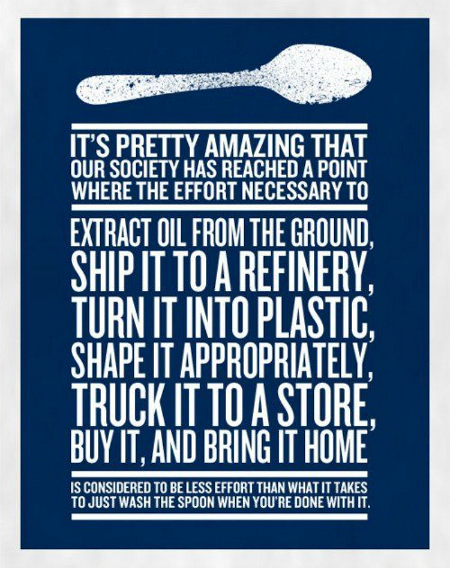If you missed this little bit of news earlier this year, the oceans will contain more plastic than fish by the year 2050 – 124 million tons of plastic to be exact.
If that doesn’t scare the heck out of you, I’m not sure what will.
What’s more, plastic production is expected to double in the next 20 years. DOUBLE!
Plastics are made from petroleum, rarely recycled, and will never biodegrade. They actually photodegrade – breaking into smaller and smaller bits when exposed to sunlight – but they never, ever go away.
In fact, every piece of plastic ever made still exists today. EVERY. SINGLE. PIECE.
If, like me, you find this a little unnerving, you may want to take some steps to contribute less plastic waste to our world, and ultimately our oceans.
Here are a few simple things that we can all do:
Replace disposable plastics with reusables.
Because this…

With just the slightest amount of effort, it’s quite easy to avoid disposable plastic. Bring reusable shopping bags to the store, bring a reusable water bottle to the gym, and whenever you can, use real dishes and utensils – wash don’t toss.
Avoid Styrofoam.
Otherwise known as the plastic polystyrene (Number 6 plastic), Styrofoam is one of the worst ocean polluters. In addition, it’s virtually unrecyclable.
Although I try to avoid disposable plastics as much as possible, PET (Number 1 plastic) – like that found in disposable water bottles – is highly recyclable. If you must use disposable plastic, it is a much better choice than Styrofoam.
For more information on the types and safety of plastics, see my related post “Plastics by the Numbers“.
Consider packaging.
32% of plastic packaging falls outside of collection systems – yes, a full 32% of it doesn’t even find it’s way in to the trash can. It’s litter!
Buy in bulk; purchase un-bagged produce (and bring your own reusable produce bags to the store); and refuse to purchase products with excessive packaging. Finally, let manufacturers know that you want less, more streamlined packaging. Consumer-driven change can have a big impact.
If you must use plastic, recycle it.
Although most plastics can be recycled, only 14% of them are. Recycling uses much less energy than incinerating, and plastics can be recycled into a wide range of products.
If it can’t be recycled, at least make sure it ends up in the trash.
At the very, very least, make sure the plastic that you do use is disposed of properly. Plastic trash that starts on the road side, eventually ends up in the oceans – killing marine life and impacting our water quality.
More plastic than fish by 2050?! I believe that we can change that. And there is no better time to start than today.